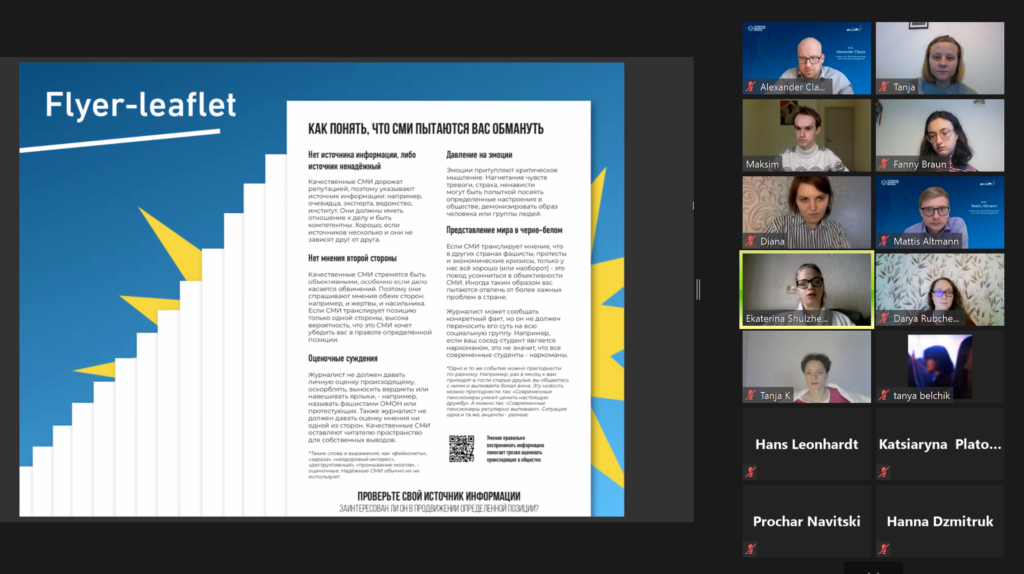The TU Dresden Media Center organised a German-Belarusian winter school about digitalisation of education, social and economic engagement in the third sector. The T3W Project team shared their experience and knowledge with international participants. The Belarusian protests played a role as well.
Stereotypes, misunderstandings, prejudices: Fanny Braun and Tanja Belchik have had enough of it. They want to offer intercultural trainings for young people around the world to educate them and allow them to network. A business plan already exists even though they didn’t even know each other a few weeks ago. Braun is studying politics at the University of Münster, Belchik informatics and radio electronics at the Belarusian State University of Informatics and Radioelectronics. They developed their project with two other persons in many Zoom sessions.
Braun and Belchik are 2 out of 25 students who participated in the winter school “Digital Media Formats in Education and Entrepreneurship”. The focus of the four-week project was placed on the potential of digitalisation for student initiatives, educational projects and social companies. “We wanted to show how social engagement works in difficult times and connects motivated people”, organiser Tanja Dashuk from the TU Dresden Media Center said.
How is the market for social companies developing? Which tools and approaches exist for communicating with the external world or organisation of the team? The lecturers, including Professor Eric Schoop from the chair for media informatics and Professor Thomas Köhler, head of the TU Dresden Media Center, were dealing with these kinds of questions. “Digitalisation goes along with new social forms” he says. “Therefore, suitable organisational didactics against the background of a precise understanding of social and communicative processes are necessary.” The winter school has also benefited from the project “The Third Way”, in which a new curriculum for social companies is developed. Thanks to this strategic partnership the young initiators of social businesses could take part in the series of workshops by Doctor Allan Lawrence from Projects Beyond Borders and the Organisational Learning Centre in the UK.
Between the seminars the students developed their own social projects in small groups and presented them during the final meeting. Even though Braun and Belchik won’t realise their idea for now they are enthusiastic about the winter school. “These were exclusive lectures just for us”, Braun said. They showed her the opportunities online but also the amount of preparation and knowledge necessary for online teaching. Belchik agrees with her, but: “The winter school was also an escape from everyday life in Belarus for me.”
This Belarussian everyday life was, besides Corona, the reason for the digital winter school although an analogue summer school was planned. For this project Dashuk got grants from the DAAD-program “Summer schools in foreign countries”. She comes from Belarus herself, so her homeland was an obvious partner country. Politics and the protests were not an explicit issue, but the winter school was supposed to be a room for informal exchange and new perspectives. “I got to know people my age who live and study in a totally different political situation”, said Braun. Their optimism was “very inspiring”.
The situation in Belarus also influenced the projects, developed by participants. The target of “Media Literacy in Belarus” for example was to reduce the spread of disinformation. The four Belarussian founders wanted to hand out flyers to older citizens to explain the creation of fake news and inform about a reflected media usage. The organisers and lecturers of the winter school liked the idea so much that they want to support it in the future as well. “The flyers are already created”, said Dashuk. Now they need lawyers to check the texts and make sure they won’t get misunderstood and put their makers in jail. “The project shows”, Dashuk said, “that nobody in Belarus is standing on the side lines anymore.”
by Luise Anter, translation from German by Hans Leonhardt
Original: Dresdner Universitätsjournal No.2 2021, p. 4

